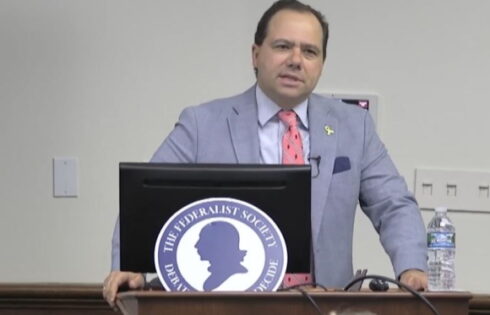
No ideological litmus tests, Heterodox Academy says
A recent grant notice from the National Institutes of Health baring participation in “diversity, equity, and inclusion” programs has ignited debate among scholars over the federal government’s criteria for research funding.
Some described the agency’s “Notice of Civil Rights Term and Condition of Award,” issued April 21, as an “ideological litmus” test and a “power” play by the Trump administration. However, an education policy analyst defended the notice, telling The College Fix that DEI programs often conflict with civil rights law.
One of the groups pushing back against the new grant funding conditions is the Heterodox Academy, a nonprofit advocacy group “dedicated to advancing open inquiry, viewpoint diversity, and constructive disagreement to change the culture across higher education.”
In an April 24 letter, Heterodox Director of Policy Joe Cohn and Policy Analyst Raheem Williams urged NIH Director Jay Bhattacharya to rescind the notice.
It “ironically threatens the free speech and academic rights of institutions and researchers,” Cohn and Williams wrote. “It is also unconstitutional.”
The academic organization found issues specifically with a requirement in the notice, which states that grant recipients may not “operate any programs that advance or promote DEI, DEIA, or discriminatory equity ideology in violation of Federal anti-discrimination laws.”
Cohn and Williams wrote that while their organization agrees higher education institutions often wrongly use DEI for “political litmus tests,” the Heterodox Academy does not think the government should impose its own anti-DEI beliefs on scholars.
“We hope you will agree that viewpoint-based censorship is wrong regardless of the view that is targeted,” they wrote.
“Because the Notice prohibits all DEI and DEIA activities and makes no effort to target only those practices which are actually unlawful (for example, hiring on a discriminatory basis), the Notice conditions funds on institutions abandoning protected activities,” Cohn and Williams wrote.
Another issue raised by the Heterodox representatives is that, “The Notice does not place conditions on how the award money is spent, but rather seeks to require institutions to abandon activities that are protected by academic freedom pursuant to the First Amendment.”
The press team of Heterodox Academy declined to comment when contacted by The Fix, asking if the NIH had responded to the letter. Neither of the letter authors responded to The Fix.
The NIH notice drew even harsher criticism from the American Association of University Professors.
“Simply put: Trump’s cuts to research will kill. They are already causing cancellations to life-saving research,” spokesperson Kelly Benjamin told The Fix in a recent interview.
“These are actions of a bully fueled by racism, drunk on power,” Benjamin said via email. “They will cause untold damage to crucial research because flagging DEI includes all kinds of research: diversity of species, diversity of health impacts of all kinds of diseases.
“It’s dangerous and will cause real harm to Americans of all walks of life. Scientists are sounding the alarm but this administration is simply not listening,” Benjamin said.
However, senior research fellow Jonathan Butcher at the Heritage Foundation disagreed with that assessment.
“DEI is based on racial favoritism,” the education policy expert told The Fix in a recent interview. “The activities of DEI offices, from promoting racial preferences in college admissions to overseeing requirements that job applicants or student applicants submit DEI statements as a condition of applying, are all based on the use of racial prejudice.”
Further, Butcher said, “The Supreme Court has ruled against the use of racial favoritism in college admissions, but the ruling has broader impacts that reinforce the Civil Rights Act of 1964—thus DEI has no place in American life.”
Butcher emphasized, “DEI activities routinely violate state and federal civil rights laws, so carrying out DEI programs is not a matter of free speech but rather making sure individuals are not violating civil rights statutes.”
While the debate continues, whether the National Institute of Health will rescind its recent notice remains to be seen.
When contacted by The College Fix to ask about the notice and the criticism it has received, the NIH media relations office initially stated its intention to respond. However, the agency did not respond by its promised deadline or to a follow up email late last week.
MORE: NIH gives professor $3.6 million to study ‘microaggressions’ on ‘pansexual’ youth
IMAGE CAPTION AND CREDIT: The National Institutes of Health logo. NIH/Grok
Like The College Fix on Facebook / Follow us on Twitter






Please join the conversation about our stories on Facebook, Twitter, Instagram, Reddit, MeWe, Rumble, Gab, Minds and Gettr.